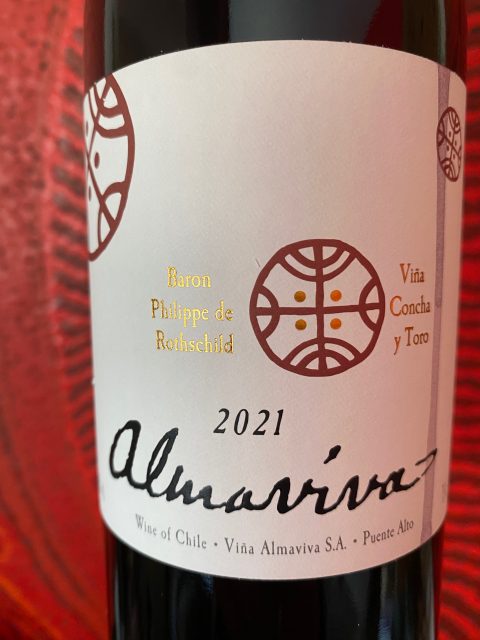Top South American releases of the ‘hors Bordeaux’ campaign
Fine wines from Chile and Argentina have increasingly come onto Bordeaux’ global distribution system – with this September markting the debut of Clos Apalta and Vigna Maquis in the Colchagua Valley, and Argentina’s Caro, the first release of the joint venture between Nicolas Catena and Domaines Barons de Rothschild. db’s correspondent Colin gives his appraisal of the latest releases from Argentina, Chile and Uruguay on La Place.

Chilean releases
| Vintage | Region | 1st release? | Rating | |
| Rocas de Seña | 2021 | Aconcagua Valley | No | 95 |
| Seña | 2021 | Aconcagua Valley | No | 97+ |
| Viñedos Chadwick | 2021 | Maipo Valley | No | 98 |
| Le Petit Clos | 2020 | Colchagua | Yes | 93+ |
| Clos Apalta | 2020 | Colchagua | Yes | 97 |
| EPU (Almaviva) | 2021 | Maipo Valley | No | 94 |
| Almaviva | 2021 | Maipo Valley | No | 98 |
| Montes Muse | 2020 | Maipo Valley | No | 94 |
| Viñe Maquis Franco | 2013 | Colchagua | No | 94 |
| Viñe Maquis Franco | 2019 | Colchagua | No | 95 |
| Viñe Maquis Viola | 2013 | Colchagua | No | 94 |
| Viñe Maquis Viola | 2019 | Colchagua | No | 96+ |
| Santa Rita ‘Casa Real’ Cab. Sauvignon | 2020 | Maipo Valley | No | NYT |
Rocas de Seña 2021 (Aconagua Valley; 35% Malbec; 21% Syrah; 20% Cabernet Sauvignon; 10% Grenache; 9% Petit Verdot; 5% Mourvedre; 6% Petit Verdot; aged in oak barrels, 40% of which are new, and concrete eggs; 14% alcohol). Tasted twice, the second time with Francisco Baettig over Zoom. Pretty. Naturally sweet. Pomegranate, raspberry and cracked green and black peppercorns with a racy acidity. A hint of spearmint with aeration and a little lavender. Sweetly spiced – a touch of the bazar about it! Curry powder. Coriander. Nutmeg. Cloves. Black pepper. The most lovely and delicately judged hint of oak too. Pure, precise, with a nice sense of grip and a lovely glacial crystallinity that comes from the very refined (yet not inconsiderable) tannins. Tender and taut. Not massive but very good, with an impressively compact, dense and freshly fruited core. Seña itself was not at this level until relatively recently. The progression is truly impressive. 95.
Seña 2021 (Aconcagua Valley; 50% Cabernet Sauvignon; 27% Malbec; 17% Carmenere; 6% Petit Verdot; aged in oak barrels, 70% of which are new, and foudres; 14% alcohol). Tasted twice, the second time with Francisco Baettig over Zoom. Cooler as a vintage, so with a little more Malbec and a little less Carménère. Fresh and complex and aromatically highly expressive. Less overtly spicy than Rocas. Cloves. Nutmeg. Cumin. Crushed rose petals and violets. But all restrained and in moderation. Grenadine. Pomegranite and red berry fruit. Great complexity and impressive layering. This it taut and tight and with excellent concentration, fine-grained tannins holding it close to the spine and lovely density and compactness. 97+.
Viñedos Chadwick 2021 (Maipo Alto; 97% Cabernet Sauvignon; 3% Petit Verdot; aged in a combination of new oak barrels (80%) and foudres; 14% alcohol). Tasted twice, the second time with Francisco Baettig over Zoom. Elegant, a little more relaxed and less vertical on the nose and a shade broader and more ample in the mouth than Seña. Floral with classic rose petals alongside the spicy curry notes – coriander and cumin, curry leaf, a little cardamom. Violets. Liquorice. A very pure and intense fruit profile of cassis and raspberry purée – almost raspberry liqueur. Very concentrated and precise and glacial in its crystallinity. A touch of cordite and struck match too. Excellent. Remarkably fine-grained tannins from this cooler vintage with a longer hang time. Cool on the radiant and long finish. 98.
Le Petit Clos 2020 (Apalta Valley, Colchagua, Chile; a blend of Carménère, Merlot, Cabernet Sauvignon and a little Petit Verdot; 15% alcohol). The second wine of Clos Apalta. Aromatically very open, with a heady mix of incense, olive tapenade, exotic sweet spices and dark berry and stone fruit, but also a little mimosa. The tannins are soft and plush, the mid-palate richly filled and this is impressively well-sustained on the finish. It’s tempting to pull the cork on this right now, but this is also very age-worthy and will benefit from a period of 2-3 years in the cellar. 93+.
Clos Apalta 2020 (Apalta Valley, Colchagua, Chile; 64% Carménère; 19% Cabernet Sauvignon; 15% Merlot; 2% Petit Verdot; 15% alcohol). Gosh, this is lovely. There are plenty of very floral wines amongst this September’s releases on La Place, but this is perhaps the most intensely floral aromatically of them all. Lily and iris, violet and a touch of rosemary and lavender, saffron and pollen grains too, beeswax, and copious black berry and stone fruit. There’s a little wood smoke too and a touch of Szechuan pepper. On the palate this is lithe and limpid, energetic and dynamic and rather more saline in its minerality than one expects from the nose, with plenty of salty liquorice. The tannins are of gossamer, though they build in the mouth, slowly shaping and sculpting the highly contoured, richly-detailed mid-palate. This is really excellent. 97.
EPU (Almaviva) 2021 (Maipo Valley; 80% Cabernet Sauvignon; 15% Carmenere; 5% Merlot; 15% alcohol). The second wine of Almaviva. Lots of vertical lift and energy on the highly expressive nose. A lovely Cabernet leafiness and a plump dark berry fruit, with a little hint of cedar and no doubt more to come, a delicate touch of sweet spice, a little roasted espresso bean and a cool stony minerality. Very pure, very soft and very elegant with lovely highly refined but still grippy tannins, a gracious evolution over the palate and an impressively long and gently tapering finish. 94.
Almaviva 2021 (Maipo Valley; 71% Cabernet Sauvignon, 22% Carménère, 5% Cabernet Franc; 2% Petit Verdot; 15% alcohol). The original hors Bordeaux to be released through La Place and still one of the absolute superstars of any September campaign. It does not disappoint. This is incredibly refined and yet gloriously and effusively expressive aromatically – even if one has the very palpable sense of so much more still to be revealed. There is a radiant fresh florality here this is wonderfully enchanting and that intermingles with the prominent graphite, pencil shaving and cedar notes and, of course, that deep, dark, rich, plump but soft berry and stone fruit. There’s cracked black and Szechuan peppercorns and even a little hint of chili. The gossamer tannins are phenomenally fine-grained and yet exude that chalky grippy-ness that is so essential to both the mouthfeel and the finely chiselled and highly contoured and pixilated character of the wine. Gloriously refined and the very epitome of Bordeaux craft and sophistication. Utterly charming and beguiling just like the Mozart opera and the Beaumarchais play after one of whose lead characters the wine is, of course, named. 98.
Montes Muse 2020 (Valle de Maipo; 100% Cabernet Sauvignon; 14% alcohol). Gracious, engaging and highly expressive aromatically, this is another very pure and precise expression of top Maipo Valley Cabernet Sauvignon. It has an impressive sense of dynamism and clarity in the mid-palate, a pleasing peppery florality, a little hint of vanilla and a touch of spice, all gently enrobing the cassis and blackberry fruit. Nicely balanced and accessible already. 94.
Viñe Maquis Viola 2019 (Colchagua Valley; 87% Carménère; 13% Cabernet Franc; 14% alcohol). Eric Boissenot is the consultant and this is such a Boissenot wine. Floral, lifted, pure, bright, crisp, fresh and hyper-pure, with a lovely touch of Carménère leafiness and a delicate subtle saline and slightly ferrous minerality. Such a pure, vibrant and aromatic expression of Carménère. Very soft tannins enrobe the plush core of this very well and tightly structured wine, build around a very precise and slender but fully fleshed core. Tender and gorgeous. I love this. Very sapid with brilliantly expressive scrunched fruit on the finish. 96+.
Viñe Maquis Viola 2013 (Colchagua Valley; 87% Carménère; 11% Cabernet Franc; 2% Cabernet Sauvignon; 14% alcohol; Eric Boissenot, once again, the consultant). This seems a little more evolved on the nose than the cuvée Franco from the same vintage, with more secondary and tertiary components. It’s quite gamey, almost slightly feral, but with a lovely subtle forest floor and wild mushroom and white truffle note just beginning to develop. The saline minerality is quite pronounced too and there’s a little whetstone note. This is slightly more ample on the attack and with a little more concentration too on the palate. But it has that same fresh and gracious glossiness in the mid-palate that is very Boissenot. Stylish, sleek and very refined with a pleasing fresh sapidity on the finish. 94.
Viñe Maquis Franco 2019 (Colchagua Valley; 94% Cabernet Franc; 6% Cabernet Sauvignon hence the name; Eric Boissenot, once again, the consultant). Refined, pure, lifted and very elegant through a little more restrained and a little lighter in style. Slightly less leafy, more blueberry fruit, more graphite and a little less evident in its minerality. Slightly more sweet spiced – nutmeg. Fluid and gracious in the mid-palate where the salinity of the minerality is much more evident. Impressive density and compactness, darker fruited and the same well-defined tight spine and core. Ultra-fresh. Long. This will need longer in the cave than the cuvée Viola, the tannins on the finish soft but considerable. Lovely fresh peppercorns linger long on the palate. 95.
Viñe Maquis Franco 2013 (Colchagua Valley; 94% Cabernet Franc; 6% Cabernet Sauvignon; Eric Boissenot was the consultant). This is fragrant, bright, fresh and very much defined aromatically by the leafy and herbal Cabernet Franc – perhaps a little less floral than the 2019 and with the accent a little more on the notes of wild thyme and lavender. Soft and lithe on the palate, with great finesse and elegance, an impressive purity to the cassis and blueberry fruit and a lovely crystalline limpidity at its core, this glides gracefully all the way to a slender and sleek finish. Very subtle and gentle. 94.
Partner Content
Santa Rita Casa Real Reserva 2020 (Maipo Alto; 100% Cabernet Sauvignon; pH 3.56; 13.8% alcohol; aged in French oak barrels for 20 months, 85% of which are new; the winemaker here is something of a rising star, Sebastián Labbé – definitely one to watch). Released on the 18th of September, the anniversary of Chile’s independence from the Spanish crown. This comes from the Santa Rita Alto Jahuel Estate at the foothills of the Andes and from a rather hot vintage. Yet whilst it feels sunny (‘solaire’ as the French would have it), it is also authentically fresh, impressively aerial and intense in its parfumier’s laboratory florality. These are not wild floral scents, but more floral essences – refined, accentuated and carefully combined. They enrobe and enrich the dark berry fruit, the slight suggestion of boiled sweets, and the black peppercorns. But there’s also plump and perfectly ripe raspberry notes too, assorted warm almost Mediterranean spices – cloves, especially, with a hint of coriander seed – and a little black tea leaf too. The tannins are very polite, very fine-grained and highly refined giving this an elegance and grace despite its layered depth, intensity and serious concentration. More detailed perhaps in its layering than in its delineation over the palate at this stage, but impressive nonetheless. A pleasing freshness on the lingering finish. 95.
Uruguay releases
Bodega Garzon Balasto 2020 (Uruguay; 42% Tannat; 39% Cabernet Franc; 19% Petit Verdot; 14% alcohol). At present distributed just through a couple of négociants; tasted at the Ulysse Cazabonne ‘Carnet de Voyage’ tasting in Paris in early October. If your principal experience of Tannat comes from the vineyards of Europe and appellations such as Madiran, then this wine is likely to come as something of a surprise to you – especially in its lithe, luminous and crystalline mid-palate. Aromatically, we have rosemary, garrigue herbs and a hint of wild lavender accompanying the plump dark berry and stone fruit. There’s a dusty earthiness too. There’s cinnamon and nutmeg and a touch of oak smoke too and maybe just a suggestion of the sea vapours carried by the southern breezes from the Falklands which are the key to the freshness of this. On the palate, this is dense and compact but with an ethereal grace and clarity that one doesn’t quite anticipate from the nose. The tannins are soft and refined and this is remarkably accessible already. 94+.
Argentine releases
| Argentine releases | Vintage | Region | 1st release? | Rating |
| Caro | 2021 | Mendoza | Yes | 95+ |
| Nicolas Catena Zapata | 2020 | Mendoza | No | 97 |
| Adrianna Vineyard Mundus Bacillus Terrae | 2020 | Mendoza | No | 97 |
| Cheval des Andes | 2020 | Mendoza | No | 98 |
| La Violeta (Bodegas Monteviejo) | 2014 | Mendoza | No | 96 |
| Cobos | 2020 | Mendoza | No | 99 |
| Zuccardi Finca Canal Uco | 2020 | Mendoza | No | 96 |
Caro 2021 (Mendoza; 79% Malbec; 21% Cabernet Sauvignon; 14.5% alcohol; aged, of course, in barrels from the Domaines Barons de Rothschild’s tonnelerie in Pauillac). Another very welcome first release on la place this year. A joint venture between Nicolas Catena and Domaines Barons de Rothschild. Lush and spicy with effusive violet aromatics. Very pure. Refined. Glossy. Compact and concentrated. Impressive. Very much a Malbec wine, even with 21% Cabernet Sauvignon in the final blend – though that brings the cassis and added concentration to the mid-palate. A little Cobos-like in style. Pure. Fresh. Laser-like on the finish. The purity also makes this feel just maybe a little monotone, but that’s being rather unkind to this – as, quite honestly, it’s excellent. Long, voluptuous and quite ethereal on the finish. 95+.
Nicolas Catena Zapata 2020 (Mendoza; 54% Cabernet Sauvignon; 25% Cabernet Franc; 21% Malbec; pH 3.64; 13.9% alcohol). From a small crop. Very pure. Very classic. Very fruit-forward. Very fresh. Bright, classic, floral and cedary too, the fragrant florality accentuated by the higher proportion of Cabernet Franc. Quite Bordellais in personality. Fresh and with a lovely leafiness. Very aerial and beautifully glossy and finely structured. Cool. Compact. Excellent. I think this is the best vintage of this wine I’ve ever tasted. 97.
Adrianna Vineyard Mundus Bacillus Terrae 2020 (Mendoza; 100% Malbec; 14% alcohol). More subtle and less immediately expressive than the Nicolas. Floral. Roses and peonies. Dark berry and cherry. Taut and tense and tender. Nicely delineated too. The tannins are, for now, just a little more strict – very linear – giving this a somewhat four-square character on the palate; needs time in the cellar but the potential is evident. Concentrated. Dense. Long. 97.
Cheval des Andes 2020 (Mendoza; 49% Malbec; 49% Cabernet Sauvignon; 2% Petit Verdot). I find this very much back on form in this vintage, with more refined and polished tannins. Incense and cordite. Crushed petals. Black tea leaf. Pure, lifted and aerial aromatically. Crystalline, limpid and very precise on the palate. Sleek but really intense and concentrated too. This is perhaps the best recent vintage of Cheval des Andes. Tight. Gracious. Cool. And very impressive. 98.
La Violeta (Bodegas Monteviejo) 2014 (Mendoza; 100% Malbec; 15% alcohol). Liquorice. Chocolate. Lavender. Rose petals and, of course, violets. Candlewax. Very expressive. Perhaps just slightly blitzed, even soapy, in its style and maybe lacking a little mid-palate delineation. But this is supple, sinuous and soft, with impressive concentration. It’s also ready to go and very hedonistic. There’s perhaps a slight touch of dryness on the finish and a fair trace of vanilla in the empty glass. 96.
Cobos 2020 (Mendoza; 100% Malbec; 14% alcohol). From Paul Hobbs. Very impressive. Refined, pure, precise. Delicately floral. Crushed lavender and rose petals. Intense and so super-fresh. Just wonderfully focussed and precise with brilliant grip and shape. Tight and sleek. Very long too and so very refined with remarkable quality of tannins. 99.
Zuccardi Finca Canal Uco 2020 (Mendoza; 100% Malbec; whole bunch fermentation and now with no oak either, with aging entirely in concrete vats; 14% alcohol). Lithe, pure, fresh and very vertical in its aromatic presentation, this feels every inch a wine from a high altitude limestone terroir, as indeed it is. I love both the florality and the visceral intensity of the crushed raspberry and loganberry fruit, which is what this wine is all about. Lifted aromatically and tight on the palate with lots of purity and precision. Very fine. An eloquent expression of its terroir. 96.
Click here for tasting notes by country: Italy; Spain, France, Austria and Germany; the USA; Argentina, Chile and Uruguay; New Zealand, Australia and South Africa).
Read more:
The star releases of hors Bordeaux 2023: part 1 – The Drinks Business
The star releases of hors Bordeaux 2023: part 2 – a wake up for La Place
The star releases of hors Bordeaux 2023: part 3 – the myths, fragility and future
Related news
Strong peak trading to boost Naked Wines' year profitability




